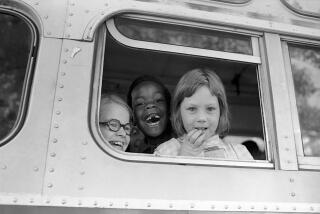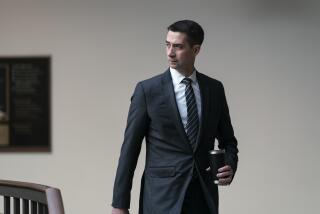Supreme Court to consider another case on racial bias in hiring
- Share via
Reporting from Washington — The controversy over racial bias, testing and firefighters that blew up at both the Supreme Court and the Senate last year returns Monday, this time as the justices decide whether blacks who were not hired in Chicago because of their test scores are due damages for years of lost wages.
The potentially $100-million civil rights case comes before a high court that has already shown its skepticism toward such claims.
Last year, the justices ruled for white firefighters in New Haven, Conn., who said they were victims of illegal racial discrimination when the city threw out the results of a promotion test. The whites had earned high scores and would have gotten nearly all the promotions. City officials dropped the test results because they feared being sued by blacks who were denied promotions.
By contrast, the city of Chicago was sued for illegal discrimination by more than 6,000 African Americans who earned “qualified” scores on an entry-level test given by the Fire Department, but who lost out to mostly white applicants who had higher, “well qualified” scores.
“This case is the flip side of Ricci,” said Benna Solomon, deputy corporation counsel for Chicago, referring to the New Haven case. “It illustrates the tension that public employers face.”
The outcome of the Chicago case may well turn on whether the lawyers for the black applicants waited a few months too long to file their suit. It’s likely to have a national impact, however, because most state and city agencies are required by law to use competitive tests for hiring.
It began in 1995 when 26,000 applicants jammed into Chicago’s United Center sports arena to take an entry-level, paper-and-pencil test for jobs in the Fire Department. Only those who scored 89 or above were considered “well qualified” for the jobs, the city said in January 1996. Assuming they passed a physical and medical test, these top scorers stood a good chance of being hired over the next eight years.
About 76% of those in the “well qualified” group were white -- 11.5% were black even though there were only slightly more whites than blacks taking the test. Mayor Richard M. Daley called the results “disappointing.” Those who scored between 65 and 88 were classified as “qualified” but were told they were unlikely to be hired.
In 1997 a group of “qualified” blacks sued, alleging racial discrimination. They relied on a part of the Civil Rights Act that says job standards, including tests, are illegal if they unfairly screen out applicants because of their race or gender.
Employers can defend themselves only if they can prove the tests were job-related and were a “business necessity.” In last year’s ruling, the Supreme Court’s conservative bloc questioned these bias claims that rely on racial statistics.
Justice Anthony Kennedy said the suits can “amount to a sort of racial preference” if employers are forced to hire based on race rather than on “equal opportunity regardless of race.” The New Haven decision became the central controversy of Justice Sonia Sotomayor’s confirmation hearings in the Senate because as a lower court judge, she had ruled against the white firefighters.
Prior to the Supreme Court’s opinion, U.S. District Judge Joan Gottschall ruled for the black applicants in Chicago. She said the city had failed to prove that those who scored at least 89 were more qualified than those whose scores were in the 70s or lower 80s. The “cutoff score of 89 is statistically meaningless,” she said.
The city’s lawyers appealed, but only to argue that the black applicants waited too long to sue. The 7th Circuit Court of Appeals agreed and threw out the blacks’ suit in 2008, ruling that they had missed the 300-day deadline for filing claims of job discrimination. The plaintiffs sued more than a year after the results were announced.
Last year, the NAACP Legal Defense Fund appealed to the Supreme Court on behalf of the black applicants, and it won the support of the Obama administration.
Shortly after ruling for white firefighters in New Haven, the high court voted to hear the case of the black applicants from Chicago.
The justices could rule narrowly on the deadlines, or more broadly on bias claims based on test scores.
The city also took a lesson from the legal fight. When it announced a new test for firefighters in 2006, it adopted a pass-fail approach. All those who had a passing score could become firefighters.
More to Read
Sign up for Essential California
The most important California stories and recommendations in your inbox every morning.
You may occasionally receive promotional content from the Los Angeles Times.











